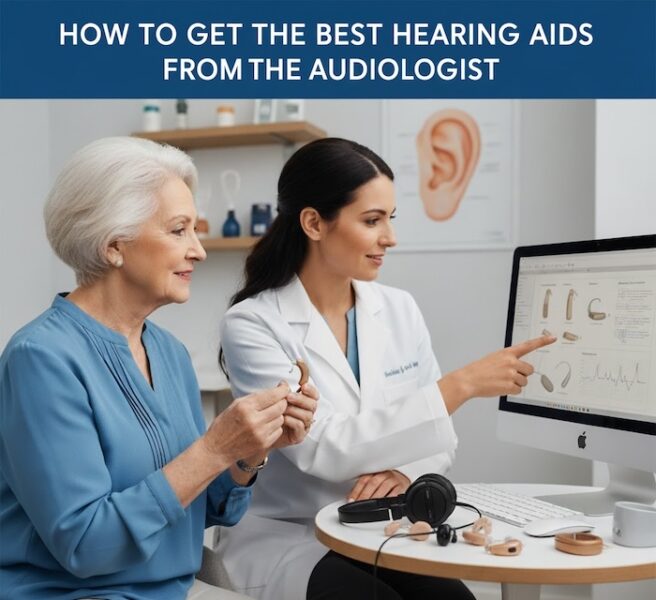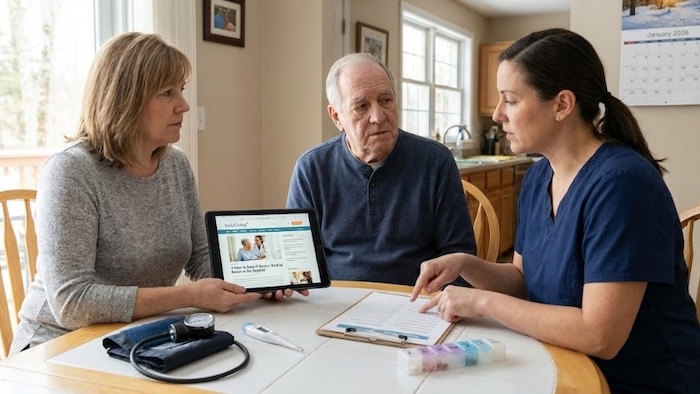Walking into an audiologist's office to choose a hearing aid can feel overwhelming, filled with technical jargon and a dizzying array of tiny, expensive devices. It's a decision that goes far beyond simply amplifying sound; it's about rediscovering the clarity of your grandchild's voice and the confidence to join in conversations again.

To ensure you walk out with the right solution and not just the most expensive one, you need to be a prepared and proactive advocate. This guide will give you the essential questions to ask and insider strategies to ensure you get the best possible hearing aids for your lifestyle, budget, and needs.
Some Hearing Aids are Better than Others
It’s frustrating when an older adult refuses to wear hearing aids that they need. But the reality is that many hearing aids don’t improve hearing enough. That’s probably why they don't like to wear them.
Hearing problems might not seem like a big deal compared to other health conditions, but untreated hearing loss is linked to serious issues like a faster decline in cognitive abilities, such as memory and concentration, hospitalization, fall risk, and depression.
We explain how to help your older adult get a hearing aid that truly improves their hearing.
Getting the Proper Hearing Aid Requires More Than Diagnostic Testing
What most people don’t know is that listening needs differ from person to person.
It’s not enough for an audiologist to check an older adult’s hearing, sell them a hearing aid, and call it a day. It’s much more complicated than that.
We found an article by Senior Planet that clearly explains why helping people hear well is much harder than assisting them to see well.
Here, we share essential information from the article. Find out:
- What an audiologist should do
- What seniors might need in addition to hearing aids
- How to get better care from an audiologist and make sure the hearing aids actually work
- How to get an audiologist to work within a budget
What an Audiologist Should Do for Seniors
An audiologist is a health-care professional trained to diagnose and treat hearing problems.
They need to look at your older adult’s specific type of hearing loss and consider all their hearing needs.
If a complete evaluation doesn’t happen, your older adult might not be able to hear, even with hearing aids.
Two assessments are needed:
- A comprehensive hearing assessment
- A communication needs assessment – that considers one's lifestyle
In the communication needs assessment, the audiologist assesses whether an older adult has any difficulty with 4 different communication methods. That’s necessary because different hearing technologies are available to help with various situations.
Comprehensive Hearing Assessment
| Test Name | What It Measures |
|---|---|
| Pure Tone Test | The quietest sounds you can hear at different pitches (frequencies). |
| Speech Assessment | How clearly you understand words at different volumes and in background noise. |
| Tympanometry | How well your eardrum moves and the health of your middle ear. |
| Real Ear Measurement | (Crucial!) Ensures the hearing aid is actually tuned to your specific ear canal. |
Communication Needs Assessment Grid
| Communication Area | Key Needs & Situations | Recommended Tech |
|---|---|---|
| Face-to-Face | One-on-one at home, noisy restaurants, or group gatherings. | Hearing aids, remote microphones, FM systems. |
| Media | Watching TV, using a tablet, or going to movie theaters. | Bluetooth streaming, TV streamers, earphones. |
| Telecommunications | Making phone calls and staying connected with family. | Direct phone streaming, captioned phones. |
| Safety & Alerts | Hearing doorbells, smoke alarms, or alarm clocks. | Vibrating alarms, flashing lights, extra-loud alerts. |
What If You Need More Than Hearing Aids? Exploring Assistive Listening Devices
Even the best hearing aids have their limits in challenging listening environments. That's where Assistive Listening Devices (ALDs) come in. They are powerful tools that work with hearing aids to tackle specific, challenging situations.
Think of ALDs as specialized audio assistants. They are designed to cut through background noise and deliver precise sound directly to your loved one's ears or hearing aids.
For example, a small, personal microphone can be placed near a television or a speaking companion, streaming the audio clearly without amplifying the surrounding noise. Other ALDs can connect to a landline or cell phone, making conversations crystal clear.
If your loved one still struggles to hear the TV, on the phone, or in noisy restaurants despite their hearing aids, asking the audiologist about ALDs is the logical next step to restore their confidence and connection.
VIDEO: How to Get the Best Hearing Aids From Your Audiologist
How to Get Better Care From the Audiologist
Not all audiologists do everything they should, so you might need to advocate for your loved one.
The best way is to give the audiologist a clear picture of all of their needs. Make a grid of the four communication needs: face-to-face, media, telecommunications, and alerts.
The information in the grid helps the audiologist determine what types of hearing technology will work best for your older adult’s lifestyle.
What “the grid” looks like:
- Write the four needs along the top
- Down the side, list all the places where your older adult needs to be able to hear: home, in the car, at social gatherings, in restaurants, in grocery stores, etc.
- For each need, ask how well they can hear in each place. For example, you and your loved one might have trouble talking with someone face-to-face at a noisy restaurant or hearing other cars honking when they’re driving. However, they might be able to hear pretty clearly when having a one-on-one conversation at home.
After your loved one receives their hearing aids, their audiologist should test them to ensure they work well.
The hearing aids should be adjusted and checked using “real ear measurement.” That’s when a small microphone is placed next to the eardrum to test whether the hearing aid gives enough amplification for soft, medium, and loud sounds.
How to Find an Audiologist Who Will Work Within Your Budget
Before making an appointment with an audiologist, speak with them on the phone to make sure they can meet your older adult’s needs.
Explain that you’re looking for someone who can evaluate hearing needs and can recommend a variety of technologies at different price points.
For example, an audiologist might suggest a hearing aid telecoil and a generic ALD as a budget-friendly alternative to an expensive wireless hearing aid.
You can also ask them to “unbundle” their billing. The audiologist’s service fees are listed separately from the hearing equipment. Seeing exactly what your older adult is paying for can save money.
Final Thoughts on Getting the Best Hearing Aids from an Audiologist
Selecting the right hearing aid is the beginning of a journey back to a richer, more connected life. Remember, the perfect device is the one you'll actually wear and enjoy using every day. By being an informed partner from the very start, you've set the stage for long-term success.
Now, you can look forward to rediscovering the subtle, beautiful sounds of life, from the morning birdsong to the easy flow of a family dinner – with newfound clarity and joy.
Recommended for you:
- Treating Hearing Loss Reduces Dementia Risk
- Affordable Hearing Aid Alternatives for Seniors: Hearing Amplifiers
- Seniors with Hearing Loss Stay Connected with Free Caption Phones
About the Author

Connie is the founder of DailyCaring.com and was a hands-on caregiver for her grandmother for 20 years. (Grandma made it to 101 years old!) She knows how challenging, overwhelming, and all-consuming caring for an older adult can be. She also understands the importance of support, especially in the form of practical solutions, valuable resources, and self-care tips.













